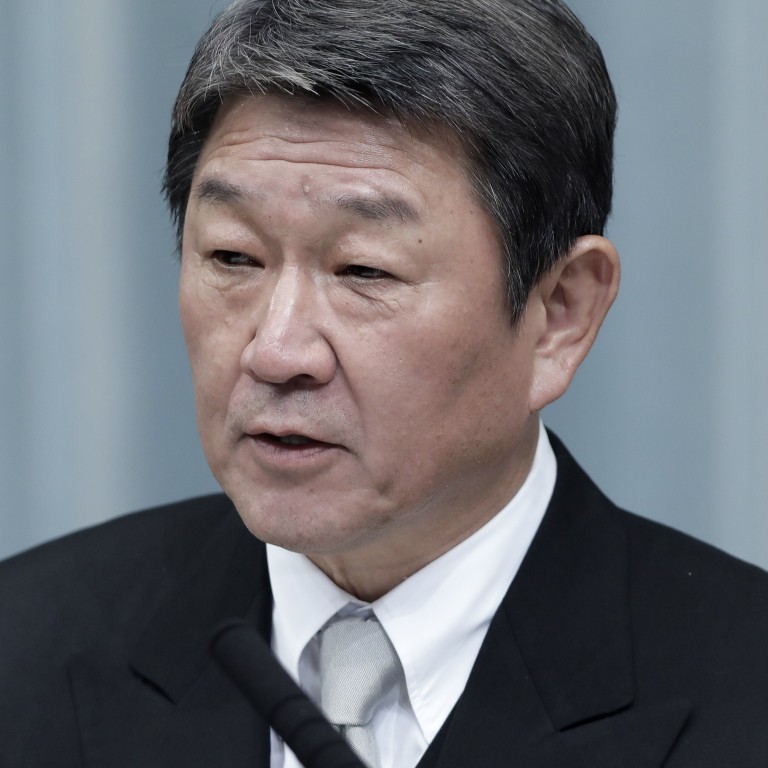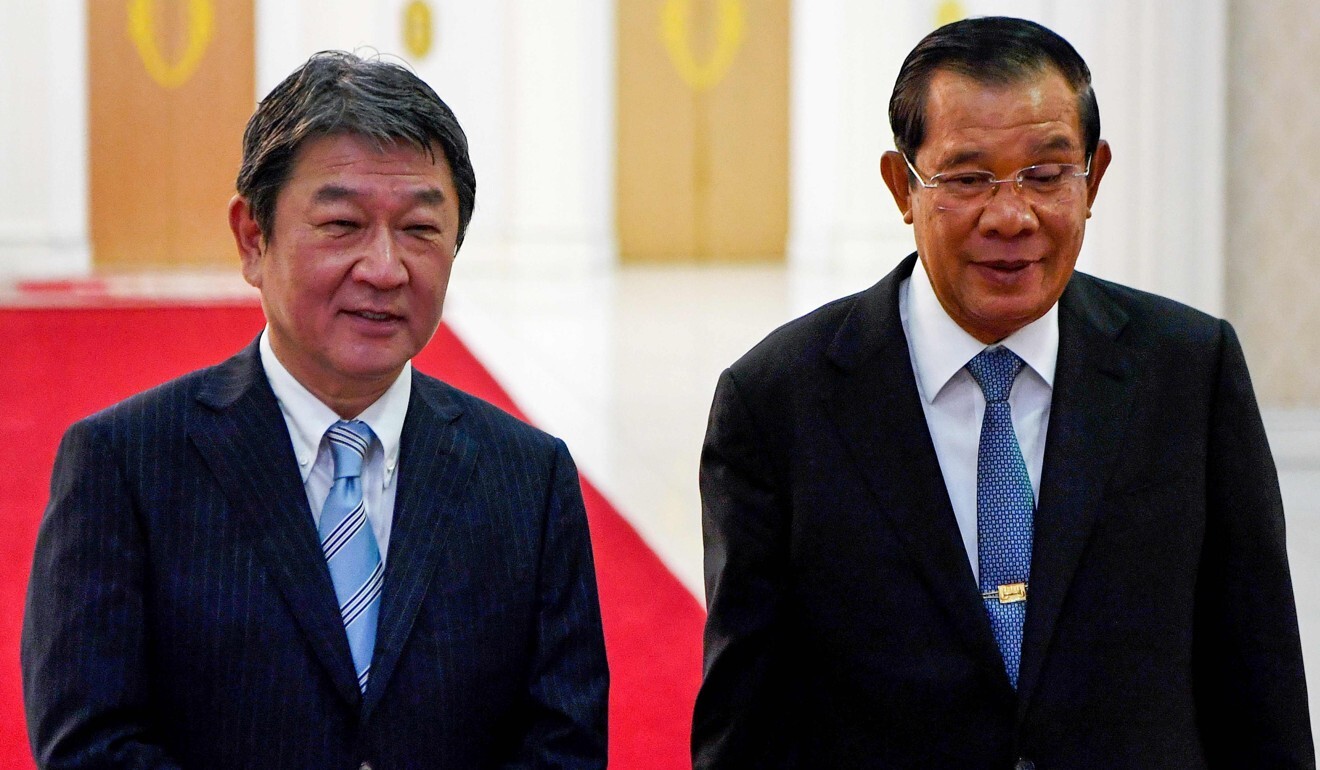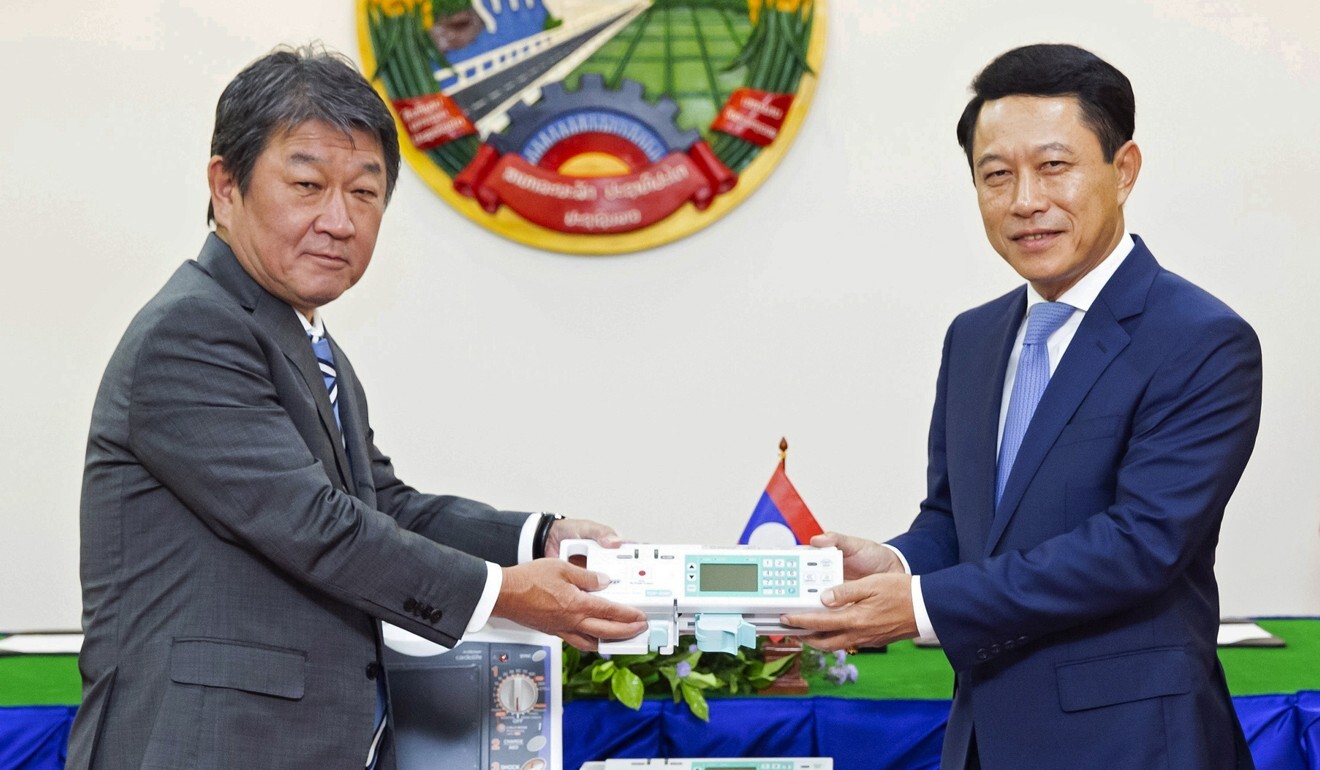
Japan’s Motegi pledges aid to Mekong countries, champions Indo-Pacific as Asean tour ends
- Tokyo is seeking to boost ties with Southeast Asia amid US-China tensions and its efforts to diversify supply chains, analysts say
- Japan’s Foreign Minister also promoted a rules-based approach to resolving disputes as Beijing ramps up its assertiveness in the South China Sea
As both agreed to reopen borders for expatriates and relax travel restrictions, Motegi pledged loans of 30 billion yen (US$283 million) as emergency budget support and 15 billion yen to help small and medium-sized firms hit by the economic downturn, the Japanese Foreign Ministry said.
Motegi held similar discussions in Cambodia and Laos over the weekend: in Vientiane, he promised grant aid totalling nearly 2 billion yen to upgrade schools and a further 500 million yen for a fleet of buses, while in Phnom Penh, he said Japan would continue supporting the country’s economic development through the construction of an “economic corridor” or road linking Thailand and Vietnam, Japanese broadcaster NHK reported.

Chinese Premier Li Keqiang made the commitment in the third leaders’ meeting of the Lancang-Mekong Cooperation, which he attended virtually. He also promised to support the nations with public health efforts and to provide anti-epidemic drugs.
Japan tells China to refrain from activities near disputed islands
“Japan has had pretty good relations with all of these countries for many years,” he said.
“He wants to use the opportunity of the coronavirus crisis to strengthen Japan’s relations with Asean nations, particularly as Japan switches its supply chains out of China and into Southeast Asia,” he said. “That appeals to those countries as well, so both sides see it as a good opportunity.”
These visits are clearly political and strategic as Japan wants Asean to stick with its rules-based approach to issues
A recent survey by Standard Chartered Bank found that for countries seeking to diversify their supply chains because of US-China tensions and the pandemic, Vietnam remains the most favoured destination, followed by Cambodia, Myanmar, Bangladesh and Thailand.
Arase said Tokyo had been “very proactive in arranging face-to-face meetings between government ministers” while Washington and Beijing were preoccupied and had built up “credibility” for the way it had handled the pandemic – something neither China nor the United States could claim, he added.
Japan moves to secure rare earths to reduce dependence on China
The sea dispute also came up with Hun Sen and Laotian Prime Minister Thongloun Sisoulith, according to details of the meetings given by Japan’s Foreign Ministry. While Cambodia and Laos, like Singapore, are not party to the dispute, the two have benefited from Chinese largesse and have tended to be more accommodating of Beijing’s assertiveness, leading to them being described as client states.

02:32
Washington’s hardened position on Beijing’s claims in South China Sea heightens US-China tensions
While Beijing has reached out to Asean diplomats to urge for a continuation of discussions on a code of conduct, observers say it is possible that the Southeast Asian claimants are gearing up to call for Unclos to form the basis of dispute resolution.
Said Arase: “At all his stops, Motegi has mentioned the ‘Free and Open Indo-Pacific’ strategy, which closely parallels the US position, so these visits are clearly political and strategic as Japan wants Asean to stick with its rules-based approach to issues.”
Revised free trade deal between Japan and half of Asean goes into effect
Vannarith Chheang, president of Phnom Phen-based Asian Vision Institute, said Motegi’s visit to Cambodia had been “successful” and Tokyo’s offers of economic assistance was widely appreciated, adding that it was important for Japan to play a more prominent role in the region.
“Japan is the most honest regional middle power; it does not threaten Southeast Asia’s economy and it can play an important role between the US-Chinese rivalry and help mediate a middle way,” he said. “Japan is earning the trust of Southeast Asian countries, whose primary aims are to promote security and regional peace.”
Chheang said countries in the region were “pragmatic” in the face of pressure from the US and China and were not interested in taking sides. “These countries survived the Cold War and they are doing their best to stay neutral again now,” he added.
Japan and US defence ministers to hold talks, with eye on China
Japan announced in June that it would provide 1.9 billion yen (US$18 million) in grant aid to support the island’s medical and health systems, as well as to improve maritime security. In a separate agreement, Motegi also vowed to boost Japanese investments in Papua New Guinea.

The Japanese minister also chaired an online conference with the foreign ministers of Kazakhstan, Kyrgyzstan, Tajikistan, Turkmenistan and Uzbekistan on August 11, during which he also extended the offer of economic assistance and urged for “solidarity” to achieve a “free and open international order” in the Indo-Pacific.
Yakov Zinberg, a professor of East Asian studies at Tokyo’s Kokushikan University, said that “geopolitics is Japan’s primary aim, followed by economic issues”.
“It's much more than just money being provided to these nations,” he said.
“They are all on the route that oil comes to Japan and it’s a desperately important issue for Tokyo,” Zinberg said. “Japan has to forge strategic partnerships in the areas surrounding China and there is a growing sense of urgency to do that.”
Additional reporting by Kyodo

